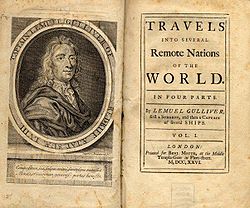Gulliver in Lilliput

First edition of Gulliver's Travels
|
|
| Author | Jonathan Swift |
|---|---|
| Original title | Travels into Several Remote Nations of the World. In Four Parts. By Lemuel Gulliver, First a Surgeon, and then a Captain of several Ships |
| Country | Ireland |
| Language | English |
| Genre | Satire, fantasy |
| Publisher | Benjamin Motte |
|
Publication date
|
28 October 1726 |
| Media type | |
| 823.5 | |
| Text | at |
Gulliver's Travels, whose full title is Travels into Several Remote Nations of the World. In Four Parts. By Lemuel Gulliver, First a Surgeon, and then a Captain of Several Ships, (1726, amended 1735), is a prose satire by Irish writer and clergyman Jonathan Swift, that is both a satire on human nature and the "travellers' tales" literary subgenre. It is Swift's best known full-length work, and a classic of English literature. He himself claimed that he wrote Gulliver's Travels "to vex the world rather than divert it".
The book became popular as soon as it was published. John Gay wrote in a 1726 letter to Swift that "It is universally read, from the cabinet council to the nursery."
The travel begins with a short preamble in which Lemuel Gulliver gives a brief outline of his life and history before his voyages.
During his first voyage, Gulliver is washed ashore after a shipwreck and finds himself a prisoner of a race of tiny people, less than 6 inches (0.50 ft) tall, who are inhabitants of the island country of Lilliput. After giving assurances of his good behavior, he is given a residence in Lilliput and becomes a favorite of the Lilliput Royal Court. He is also given permission by the King of Lilliput to go around the city on condition that he must not harm their subjects.
At first, the Lilliputians are hospitable to Gulliver, but they are also wary of the threat that his size poses to them. The Lilliputians reveal themselves to be a people who put great emphasis on trivial matters. For example, which end of an egg a person cracks becomes the basis of a deep political rift within that nation. They are a people who revel in displays of authority and performances of power. Gulliver assists the Lilliputians to subdue their neighbors the Blefuscudians by stealing their fleet. However, he refuses to reduce the island nation of Blefuscu to a province of Lilliput, displeasing the King and the royal court.
Gulliver is charged with treason for, among other crimes, "making water" in the capital though he was putting out a fire and saving countless lives. He is convicted and sentenced to be blinded. With the assistance of a kind friend, "a considerable person at court", he escapes to Blefuscu. Here, he spots and retrieves an abandoned boat and sails out to be rescued by a passing ship, which safely takes him back home.
...
Wikipedia
